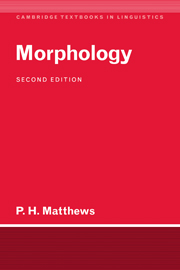Book contents
- Frontmatter
- Contents
- Preface to the first edition
- Preface to the second edition
- Principal references
- 1 What is morphology?
- 2 Word, word-form and lexeme
- 3 Inflections and word-formation
- 4 Lexical derivation
- 5 Compounds
- 6 Morphemes and allomorphs
- 7 Morphological processes
- 8 Morphophonemics
- 9 Properties and their exponents
- 10 Paradigms
- 11 Inflectional morphology and syntax
- 12 Iconicity
- Index
3 - Inflections and word-formation
Published online by Cambridge University Press: 05 June 2012
- Frontmatter
- Contents
- Preface to the first edition
- Preface to the second edition
- Principal references
- 1 What is morphology?
- 2 Word, word-form and lexeme
- 3 Inflections and word-formation
- 4 Lexical derivation
- 5 Compounds
- 6 Morphemes and allomorphs
- 7 Morphological processes
- 8 Morphophonemics
- 9 Properties and their exponents
- 10 Paradigms
- 11 Inflectional morphology and syntax
- 12 Iconicity
- Index
Summary
Similarity between fields: formatives.
Why the distinction? Division of dictionary and grammar; but why is that justified? Word-formation as change of part of speech: criterion not satisfactory. Inflections as syntactically determined (Italian -o/-a in Nouns vs Adjectives); criterion natural but not sufficient (Number of Nouns, Comparatives, English -ion). Test whether complex word can be replaced by simple. Criterion of regularity: gaps in word-formation; regularity and irregularity of meaning. No single criterion adequate in all cases.
Change and indeterminacy. Changes in the status of formatives (Latin/Italian -sc-); hence synchronic blurring (Participles and Participial Adjectives). Likewise for derived and simple lexemes: effect of learned borrowing (French Adjectives in -al).
In the last chapter we underlined the technical distinction between relations within paradigms (inflectional morphology) and relations among lexemes (lexical morphology). In the case of compounding its justification is sufficiently obvious. Forms like what and ever or salmon and fall represent distinct lexemes (what, ever, salmon, fall), and forms which combine them, if not syntactic, must also be lexemes (whatever, salmon-fall). In the history of languages compounds of this type do not usually develop into inflectional formations, and there is little or no indeterminacy. But the distinction between inflections and wordformation is more difficult. In the form generation the ending -ion is not a word, just as -s is not a word in generations. On the face of it, both are simply formative elements or, as we will call them, formatives.
- Type
- Chapter
- Information
- Morphology , pp. 42 - 60Publisher: Cambridge University PressPrint publication year: 1991



